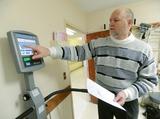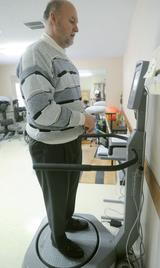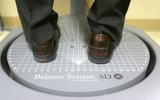- Physical Medicine Home
- Products
- Programs
- Applications
- Find a Clinic
- Blog
- Events
- Education & Training
- In The News
- Press Releases
In The News
< back to resultsBracing for a Fall - Falls a Serious Problem for Seniors, but are Preventable
January 13, 2011, 5:00am

JOPLIN, Mo. — The machine is simple: You stand on a moveable, round disc and, without using the handrails, try to keep your weight centered. It's apparently similar to standing on a surfboard or a skateboard.
The goal is equally simple: Improve your balance so your risk of falling is reduced.
Falling is a "very big problem," particularly among older adults, said Olivia Manalo-Yabut, a registered occupational therapist at Joplin Health and Rehabilitation Center, which houses the balance machine.
"With the elderly, I think it's one of the top problems that we have," she said.

According to the Centers for Disease Control and Prevention, one out of three adults age 65 and older falls each year, resulting in falls becoming the leading cause of injury death for older adults. Falls are also the most common cause of nonfatal injuries and hospital admissions for trauma.
In 2005-06, the most recent year for which data is available, Barton, Jasper and Newton counties had the highest rates in Southwest Missouri of emergency room visits and hospitalizations by older adults because of falling, according to the state Department of Health and Senior Services.
The consequences of falling can be serious. Twenty to 30 percent of victims suffer injuries including cuts and bruises, hip fractures or head trauma, according to the CDC. Most fractures among older adults — and 90 percent of hip fractures in particular — are caused by falls.
Psychological consequences exist as well, with many victims developing a fear of falling that can lead to reduced mobility and the loss of physical fitness, according to the CDC.
By taking the right steps, you can reduce your risk of falls. Be aware of the risk factors, which include losing one's strength, losing one's joint mobility, undergoing surgery and growing older, Manalo-Yabut said. Possibly the best way to avoid falling is by staying active and keeping your muscles and mobility strong, she said.
The new Biodex machine at the Joplin rehab center can assess one's risk of falling through a quick balance test. The machine can also be programmed with exercises to train one's muscles and improve balance and stability, said Randy Alsup, the center's administrator.

Alsup said he recently saw one elderly stroke patient enter the rehabilitation center using a walker. After three weeks training and strengthening her muscles on the machine, she left using only a cane, he said.
"(Patients) come to us not knowing what their balance is, not knowing whether they'll fall," he said. "We put them on this machine, and lo and behold, three weeks later they're home."
To reduce your risk of falling, the CDC also recommends that you:
• Exercise regularly, focusing on increasing leg strength and improving balance. Tai chi, a form of martial arts focusing on slow, precise movements, is especially good and has been shown through research to increase stability and balance. It's still unclear whether tai chi programs can be easily adopted and implemented by the general community.
• Ask your doctor or pharmacist to review your medicines to reduce side effects and interactions that may cause dizziness or drowsiness.
• Have your eyes checked by an eye doctor at least once a year and update your eyeglasses to maximize your vision.
• Get up slowly after you sit or lie down.
• Wear shoes both inside and outside the house. Avoid going barefoot or wearing slippers.
• Get adequate calcium and vitamin D in your diet and get screened for osteoporosis. Should you fall, these can help prevent hip fractures.
There are also several modifications you can make around your house to decrease your risk of falling at home. The Fall Prevention Center of Excellence recommends that you:
• Install grab bars and use non-slip mats or non-skid strips in the bathroom and shower, and use a raised toilet seat.
• Install handrails on both sides of a staircase.
• Install brighter lights in dark halls or stairways, and have switches at both ends.
• Keep pathways clear of objects that could cause you to trip, such as books, clothes, newspapers or shoes.
• Remove slippery rugs, or use double-sided tape to secure them to the floor.
• Keep oft-used items at levels that can be easily reached.
Risk assessment
Joplin Health and Rehabilitation Center, 2218 W. 32nd St., offers free fall risk assessments using its Biodex balance system. The assessment takes a few minutes, and no appointment is necessary. Details: 623-5264.



